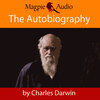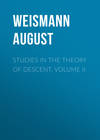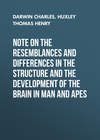Kitabı oku: «The Expression of the Emotions in Man and Animals», sayfa 19
Recapitulation. – Men and women, and especially the young, have always valued, in a high degree, their personal appearance; and have likewise regarded the appearance of others. The face has been the chief object of attention, though, when man aboriginally went naked, the whole surface of his body would have been attended to. Our self-attention is excited almost exclusively by the opinion of others, for no person living in absolute solitude would care about his appearance. Every one feels blame more acutely than praise. Now, whenever we know, or suppose, that others are depreciating our personal appearance, our attention is strongly drawn towards ourselves, more especially to our faces. The probable effect of this will be, as has just been explained, to excite into activity that part of the sensorium, which receives the sensory nerves of the face; and this will react through the vaso-motor system on the facial capillaries. By frequent reiteration during numberless generations, the process will have become so habitual, in association with the belief that others are thinking of us, that even a suspicion of their depreciation suffices to relax the capillaries, without any conscious thought about our faces. With some sensitive persons it is enough even to notice their dress to produce the same effect. Through the force, also, of association and inheritance our capillaries are relaxed, whenever we know, or imagine, that any one is blaming, though in silence, our actions, thoughts, or character; and, again, when we are highly praised.
On this hypothesis we can understand how it is that the face blushes much more than any other part of the body, though the whole surface is somewhat affected, more especially with the races which still go nearly naked. It is not at all surprising that the dark-coloured races should blush, though no change of colour is visible in their skins. From the principle of inheritance it is not surprising that persons born blind should blush. We can understand why the young are much more affected than the old, and women more than men; and why the opposite sexes especially excite each other's blushes. It becomes obvious why personal remarks should be particularly liable to cause blushing, and why the most powerful of all the causes is shyness; for shyness relates to the presence and opinion of others, and the shy are always more or less self-conscious. With respect to real shame from moral delinquencies, we can perceive why it is not guilt, but the thought that others think us guilty, which raises a blush. A man reflecting on a crime committed in solitude, and stung by his conscience, does not blush; yet he will blush under the vivid recollection of a detected fault, or of one committed in the presence of others, the degree of blushing being closely related to the feeling of regard for those who have detected, witnessed, or suspected his fault. Breaches of conventional rules of conduct, if they are rigidly insisted on by our equals or superiors, often cause more intense blushes even than a detected crime, and an act which is really criminal, if not blamed by our equals, hardly raises a tinge of colour on our cheeks. Modesty from humility, or from an indelicacy, excites a vivid blush, as both relate to the judgment or fixed customs of others.
From the intimate sympathy which exists between the capillary circulation of the surface of the head and of the brain, whenever there is intense blushing, there will be some, and often great, confusion of mind. This is frequently accompanied by awkward movements, and sometimes by the involuntary twitching of certain muscles.
As blushing, according to this hypothesis, is an indirect result of attention, originally directed to our personal appearance, that is to the surface of the body, and more especially to the face, we can understand the meaning of the gestures which accompany blushing throughout the world. These consist in hiding the face, or turning it towards the ground, or to one side. The eyes are generally averted or are restless, for to look at the man who causes us to feel shame or shyness, immediately brings home in an intolerable manner the consciousness that his gaze is directed on us. Through the principle of associated habit, the same movements of the face and eyes are practised, and can, indeed, hardly be avoided, whenever we know or believe that, others are blaming, or too strongly praising, our moral conduct.
CHAPTER XIV. – CONCLUDING REMARKS AND SUMMARY
The three leading principles which have determined the chief movements of expression – Their inheritance – On the part which the will and intention have played in the acquirement of various expressions – The instinctive recognition of expression – The bearing of our subject on the specific unity of the races of man – On the successive acquirement of various expressions by the progenitors of man – The importance of expression – Conclusion.
I HAVE now described, to the best of my ability, the chief expressive actions in man, and in some few of the lower animals. I have also attempted to explain the origin or development of these actions through the three principles given in the first chapter. The first of these principles is, that movements which are serviceable in gratifying some desire, or in relieving some sensation, if often repeated, become so habitual that they are performed, whether or not of any service, whenever the same desire or sensation is felt, even in a very weak degree.
Our second principle is that of antithesis. The habit of voluntarily performing opposite movements under opposite impulses has become firmly established in us by the practice of our whole lives. Hence, if certain actions have been regularly performed, in accordance with our first principle, under a certain frame of mind, there will be a strong and involuntary tendency to the performance of directly opposite actions, whether or not these are of any use, under the excitement of an opposite frame of mind.
Our third principle is the direct action of the excited nervous system on the body, independently of the will, and independently, in large part, of habit. Experience shows that nerve-force is generated and set free whenever the cerebro-spinal system is excited. The direction which this nerve-force follows is necessarily determined by the lines of connection between the nerve-cells, with each other and with various parts of the body. But the direction is likewise much influenced by habit; inasmuch as nerve-force passes readily along accustomed channels.
The frantic and senseless actions of an enraged man may be attributed in part to the undirected flow of nerve-force, and in part to the effects of habit, for these actions often vaguely represent the act of striking. They thus pass into gestures included under our first principle; as when an indignant man unconsciously throws himself into a fitting attitude for attacking his opponent, though without any intention of making an actual attack. We see also the influence of habit in all the emotions and sensations which are called exciting; for they have assumed this character from having habitually led to energetic action; and action affects, in an indirect manner, the respiratory and circulatory system; and the latter reacts on the brain. Whenever these emotions or sensations are even slightly felt by us, though they may not at the time lead to any exertion, our whole system is nevertheless disturbed through the force of habit and association. Other emotions and sensations are called depressing, because they have not habitually led to energetic action, excepting just at first, as in the case of extreme pain, fear, and grief, and they have ultimately caused complete exhaustion; they are consequently expressed chiefly by negative signs and by prostration. Again, there are other emotions, such as that of affection, which do not commonly lead to action of any kind, and consequently are not exhibited by any strongly marked outward signs. Affection indeed, in as far as it is a pleasurable sensation, excites the ordinary signs of pleasure.
On the other hand, many of the effects due to the excitement of the nervous system seem to be quite independent of the flow of nerve-force along the channels which have been rendered habitual by former exertions of the will. Such effects, which often reveal the state of mind of the person thus affected, cannot at present be explained; for instance, the change of colour in the hair from extreme terror or grief, – the cold sweat and the trembling of the muscles from fear, – the modified secretions of the intestinal canal, – and the failure of certain glands to act.
Notwithstanding that much remains unintelligible in our present subject, so many expressive movements and actions can be explained to a certain extent through the above three principles, that we may hope hereafter to see all explained by these or by closely analogous principles.
Actions of all kinds, if regularly accompanying any state of the mind, are at once recognized as expressive. These may consist of movements of any part of the body, as the wagging of a dog's tail, the shrugging of a man's shoulders, the erection of the hair, the exudation of perspiration, the state of the capillary circulation, laboured breathing, and the use of the vocal or other sound-producing instruments. Even insects express anger, terror, jealousy, and love by their stridulation. With man the respiratory organs are of especial importance in expression, not only in a direct, but in a still higher degree in an indirect manner.
Few points are more interesting in our present subject than the extraordinarily complex chain of events which lead to certain expressive movements. Take, for instance, the oblique eyebrows of a man suffering from grief or anxiety. When infants scream loudly from hunger or pain, the circulation is affected, and the eyes tend to become gorged with blood: consequently the muscles surrounding the eyes are strongly contracted as a protection: this action, in the course of many generations, has become firmly fixed and inherited: but when, with advancing years and culture, the habit of screaming is partially repressed, the muscles round the eyes still tend to contract, whenever even slight distress is felt: of these muscles, the pyramidals of the nose are less under the control of the will than are the others and their contraction can be checked only by that of the central fasciae of the frontal muscle: these latter fasciae draw up the inner ends of the eyebrows, and wrinkle the forehead in a peculiar manner, which we instantly recognize as the expression of grief or anxiety. Slight movements, such as these just described, or the scarcely perceptible drawing down of the corners of the mouth, are the last remnants or rudiments of strongly marked and intelligible movements. They are as full of significance to us in regard to expression, as are ordinary rudiments to the naturalist in the classification and genealogy of organic beings.
That the chief expressive actions, exhibited by man and by the lower animals, are now innate or inherited, – that is, have not been learnt by the individual, – is admitted by every one. So little has learning or imitation to do with several of them that they are from the earliest days and throughout life quite beyond our control; for instance, the relaxation of the arteries of the skin in blushing, and the increased action of the heart in anger. We may see children, only two or three years old, and even those born blind, blushing from shame; and the naked scalp of a very young infant reddens from passion. Infants scream from pain directly after birth, and all their features then assume the same form as during subsequent years. These facts alone suffice to show that many of our most important expressions have not been learnt; but it is remarkable that some, which are certainly innate, require practice in the individual, before they are performed in a full and perfect manner; for instance, weeping and laughing. The inheritance of most of our expressive actions explains the fact that those born blind display them, as I hear from the Rev. R. H. Blair, equally well with those gifted with eyesight. We can thus also understand the fact that the young and the old of widely different races, both with man and animals, express the same state of mind by the same movements.
We are so familiar with the fact of young and old animals displaying their feelings in the same manner, that we hardly perceive how remarkable it is that a young puppy should wag its tail when pleased, depress its ears and uncover its canine teeth when pretending to be savage, just like an old dog; or that a kitten should arch its little back and erect its hair when frightened and angry, like an old cat. When, however, we turn to less common gestures in ourselves, which we are accustomed to look at as artificial or conventional, – such as shrugging the shoulders, as a sign of impotence, or the raising the arms with open hands and extended fingers, as a sign of wonder, – we feel perhaps too much surprise at finding that they are innate. That these and some other gestures are inherited, we may infer from their being performed by very young children, by those born blind, and by the most widely distinct races of man. We should also bear in mind that new and highly peculiar tricks, in association with certain states of the mind, are known to have arisen in certain individuals, and to have been afterwards transmitted to their offspring, in some cases, for more than one generation.
Certain other gestures, which seem to us so natural that we might easily imagine that they were innate, apparently have been learnt like the words of a language. This seems to be the case with the joining of the uplifted hands, and the turning up of the eyes, in prayer. So it is with kissing as a mark of affection; but this is innate, in so far as it depends on the pleasure derived from contact with a beloved person. The evidence with respect to the inheritance of nodding and shaking the head, as signs of affirmation and negation, is doubtful; for they are not universal, yet seem too general to have been independently acquired by all the individuals of so many races.
We will now consider how far the will and consciousness have come into play in the development of the various movements of expression. As far as we can judge, only a few expressive movements, such as those just referred to, are learnt by each individual; that is, were consciously and voluntarily performed during the early years of life for some definite object, or in imitation of others, and then became habitual. The far greater number of the movements of expression, and all the more important ones, are, as we have seen, innate or inherited; and such cannot be said to depend on the will of the individual. Nevertheless, all those included under our first principle were at first voluntarily performed for a definite object, – namely, to escape some danger, to relieve some distress, or to gratify some desire. For instance, there can hardly be a doubt that the animals which fight with their teeth, have acquired the habit of drawing back their ears closely to their heads, when feeling savage, from their progenitors having voluntarily acted in this manner in order to protect their ears from being torn by their antagonists; for those animals which do not fight with their teeth do not thus express a savage state of mind. We may infer as highly probable that we ourselves have acquired the habit of contracting the muscles round the eyes, whilst crying gently, that is, without the utterance of any loud sound, from our progenitors, especially during infancy, having experienced, during the act of screaming, an uncomfortable sensation in their eyeballs. Again, some highly expressive movements result from the endeavour to cheek or prevent other expressive movements; thus the obliquity of the eyebrows and the drawing down of the corners of the mouth follow from the endeavour to prevent a screaming-fit from coming on, or to cheek it after it has come on. Here it is obvious that the consciousness and will must at first have come into play; not that we are conscious in these or in other such cases what muscles are brought into action, any more than when we perform the most ordinary voluntary movements.
With respect to the expressive movements due to the principle of antithesis, it is clear that the will has intervened, though in a remote and indirect manner. So again with the movements coming under our third principle; these, in as far as they are influenced by nerve-force readily passing along habitual channels, have been determined by former and repeated exertions of the will. The effects indirectly due to this latter agency are often combined in a complex manner, through the force of habit and association, with those directly resulting from the excitement of the cerebro-spinal system. This seems to be the case with the increased action of the heart under the influence of any strong emotion. When an animal erects its hair, assumes a threatening attitude, and utters fierce sounds, in order to terrify an enemy, we see a curious combination of movements which were originally voluntary with those that are involuntary. It is, however, possible that even strictly involuntary actions, such as the erection of the hair, may have been affected by the mysterious power of the will.
Some expressive movements may have arisen spontaneously, in association with certain states of the mind, like the tricks lately referred to, and afterwards been inherited. But I know of no evidence rendering this view probable.
The power of communication between the members of the same tribe by means of language has been of paramount importance in the development of man; and the force of language is much aided by the expressive movements of the face and body. We perceive this at once when we converse on an important subject with any person whose face is concealed. Nevertheless there are no grounds, as far as I can discover, for believing that any muscle has been developed or even modified exclusively for the sake of expression. The vocal and other sound-producing organs, by which various expressive noises are produced, seem to form a partial exception; but I have elsewhere attempted to show that these organs were first developed for sexual purposes, in order that one sex might call or charm the other. Nor can I discover grounds for believing that any inherited movement, which now serves as a means of expression, was at first voluntarily and consciously performed for this special purpose, – like some of the gestures and the finger-language used by the deaf and dumb. On the contrary, every true or inherited movement of expression seems to have had some natural and independent origin. But when once acquired, such movements may be voluntarily and consciously employed as a means of communication. Even infants, if carefully attended to, find out at a very early age that their screaming brings relief, and they soon voluntarily practise it. We may frequently see a person voluntarily raising his eyebrows to express surprise, or smiling to express pretended satisfaction and acquiescence. A man often wishes to make certain gestures conspicuous or demonstrative, and will raise his extended arms with widely opened fingers above his head, to show astonishment, or lift his shoulders to his ears, to show that he cannot or will not do something. The tendency to such movements will be strengthened or increased by their being thus voluntarily and repeatedly performed; and the effects may be inherited.
It is perhaps worth consideration whether movements at first used only by one or a few individuals to express a certain state of mind may not sometimes have spread to others, and ultimately have become universal, through the power of conscious and unconscious imitation. That there exists in man a strong tendency to imitation, independently of the conscious will, is certain. This is exhibited in the most extraordinary manner in certain brain diseases, especially at the commencement of inflammatory softening of the brain, and has been called the "echo sign." Patients thus affected imitate, without understanding every absurd gesture which is made, and every word which is uttered near them, even in a foreign language.[1401] In the case of animals, the jackal and wolf have learnt under confinement to imitate the barking of the dog. How the barking of the dog, which serves to express various emotions and desires, and which is so remarkable from having been acquired since the animal was domesticated, and from being inherited in different degrees by different breeds, was first learnt we do not know; but may we not suspect that imitation has had something to do with its acquisition, owing to dogs having long lived in strict association with so loquacious an animal as man?
In the course of the foregoing remarks and throughout this volume, I have often felt much difficulty about the proper application of the terms, will, consciousness, and intention. Actions, which were at first voluntary, soon became habitual, and at last hereditary, and may then be performed even in opposition to the will. Although they often reveal the state of the mind, this result was not at first either intended or expected. Even such words as that "certain movements serve as a means of expression," are apt to mislead, as they imply that this was their primary purpose or object. This, however, seems rarely or never to have been the case; the movements having been at first either of some direct use, or the indirect effect of the excited state of the sensorium. An infant may scream either intentionally or instinctively to show that it wants food; but it has no wish or intention to draw its features into the peculiar form which so plainly indicates misery; yet some of the most characteristic expressions exhibited by man are derived from the act of screaming, as has been explained.
Although most of our expressive actions are innate or instinctive, as is admitted by everyone, it is a different question whether we have any instinctive power of recognizing them. This has generally been assumed to be the case; but the assumption has been strongly controverted by M. Lemoine.[1402] Monkeys soon learn to distinguish, not only the tones of voice of their masters, but the expression of their faces, as is asserted by a careful observer.[1403] Dogs well know the difference between caressing and threatening gestures or tones; and they seem to recognize a compassionate tone. But as far as I can make out, after repeated trials, they do not understand any movement confined to the features, excepting a smile or laugh; and this they appear, at least in some cases, to recognize. This limited amount of knowledge has probably been gained, both by monkeys and dogs, through their associating harsh or kind treatment with our actions; and the knowledge certainly is not instinctive. Children, no doubt, would soon learn the movements of expression in their elders in the same manner as animals learn those of man. Moreover, when a child cries or laughs, he knows in a general manner what he is doing and what he feels; so that a very small exertion of reason would tell him what crying or laughing meant in others. But the question is, do our children acquire their knowledge of expression solely by experience through the power of association and reason?
As most of the movements of expression must have been gradually acquired, afterwards becoming instinctive, there seems to be some degree of a priori probability that their recognition would likewise have become instinctive. There is, at least, no greater difficulty in believing this than in admitting that, when a female quadruped first bears young, she knows the cry of distress of her offspring, or than in admitting that many animals instinctively recognize and fear their enemies; and of both these statements there can be no reasonable doubt. It is however extremely difficult to prove that our children instinctively recognize any expression. I attended to this point in my first-born infant, who could not have learnt anything by associating with other children, and I was convinced that he understood a smile and received pleasure from seeing one, answering it by another, at much too early an age to have learnt anything by experience. When this child was about four months old, I made in his presence many odd noises and strange grimaces, and tried to look savage; but the noises, if not too loud, as well as the grimaces, were all taken as good jokes; and I attributed this at the time to their being preceded or accompanied by smiles. When five months old, he seemed to understand a compassionate, expression and tone of voice. When a few days over six months old, his nurse pretended to cry, and I saw that his face instantly assumed a melancholy expression, with the corners of the mouth strongly depressed; now this child could rarely have seen any other child crying, and never a grown-up person crying, and I should doubt whether at so early an age he could have reasoned on the subject. Therefore it seems to me that an innate feeling must have told him that the pretended crying of his nurse expressed grief; and this through the instinct of sympathy excited grief in him.
M. Lemoine argues that, if man possessed an innate knowledge of expression, authors and artists would not have found it so difficult, as is notoriously the case, to describe and depict the characteristic signs of each particular state of mind. But this does not seem to me a valid argument. We may actually behold the expression changing in an unmistakable manner in a man or animal, and yet be quite unable, as I know from experience, to analyse the nature of the change. In the two photographs given by Duchenne of the same old man (Plate III. figs. 5 and 6), almost every one recognized that the one represented a true, and the other a false smile; but I have found it very difficult to decide in what the whole amount of difference consists. It has often struck me as a curious fact that so many shades of expression are instantly recognized without any conscious process of analysis on our part. No one, I believe, can clearly describe a sullen or sly expression; yet many observers are unanimous that these expressions can be recognized in the various races of man. Almost everyone to whom I showed Duchenne's photograph of the young man with oblique eyebrows (Plate II. fig. 2) at once declared that it expressed grief or some such feeling; yet probably not one of these persons, or one out of a thousand persons, could beforehand have told anything precise about the obliquity of the eyebrows with their inner ends puckered, or about the rectangular furrows on the forehead. So it is with many other expressions, of which I have had practical experience in the trouble requisite in instructing others what points to observe. If, then, great ignorance of details does not prevent our recognizing with certainty and promptitude various expressions, I do not see how this ignorance can be advanced as an argument that our knowledge, though vague and general, is not innate.
I have endeavoured to show in considerable detail that all the chief expressions exhibited by man are the same throughout the world. This fact is interesting, as it affords a new argument in favour of the several races being descended from a single parent-stock, which must have been almost completely human in structure, and to a large extent in mind, before the period at which the races diverged from each other. No doubt similar structures, adapted for the same purpose, have often been independently acquired through variation and natural selection by distinct species; but this view will not explain close similarity between distinct species in a multitude of unimportant details. Now if we bear in mind the numerous points of structure having no relation to expression, in which all the races of man closely agree, and then add to them the numerous points, some of the highest importance and many of the most trifling value, on which the movements of expression directly or indirectly depend, it seems to me improbable in the highest degree that so much similarity, or rather identity of structure, could have been acquired by independent means. Yet this must have been the case if the races of man are descended from several aboriginally distinct species. It is far more probable that the many points of close similarity in the various races are due to inheritance from a single parent-form, which had already assumed a human character.
It is a curious, though perhaps an idle speculation, how early in the long line of our progenitors the various expressive movements, now exhibited by man, were successively acquired. The following remarks will at least serve to recall some of the chief points discussed in this volume. We may confidently believe that laughter, as a sign of pleasure or enjoyment, was practised by our progenitors long before they deserved to be called human; for very many kinds of monkeys, when pleased, utter a reiterated sound, clearly analogous to our laughter, often accompanied by vibratory movements of their jaws or lips, with the corners of the mouth drawn backwards and upwards, by the wrinkling of the cheeks, and even by the brightening of the eyes.
We may likewise infer that fear was expressed from an extremely remote period, in almost the same manner as it now is by man; namely, by trembling, the erection of the hair, cold perspiration, pallor, widely opened eyes, the relaxation of most of the muscles, and by the whole body cowering downwards or held motionless.
Suffering, if great, will from the first have caused screams or groans to be uttered, the body to be contorted, and the teeth to be ground together. But our progenitors will not have exhibited those highly expressive movements of the features which accompany screaming and crying until their circulatory and respiratory organs, and the muscles surrounding the eyes, had acquired their present structure. The shedding of tears appears to have originated through reflex action from the spasmodic contraction of the eyelids, together perhaps with the eyeballs becoming gorged with blood during the act of screaming. Therefore weeping probably came on rather late in the line of our descent; and this conclusion agrees with the fact that our nearest allies, the anthropomorphous apes, do not weep. But we must here exercise some caution, for as certain monkeys, which are not closely related to man, weep, this habit might have been developed long ago in a sub-branch of the group from which man is derived. Our early progenitors, when suffering from grief or anxiety, would not have made their eyebrows oblique, or have drawn down the corners of their mouth, until they had acquired the habit of endeavouring to restrain their screams. The expression, therefore, of grief and anxiety is eminently human.










